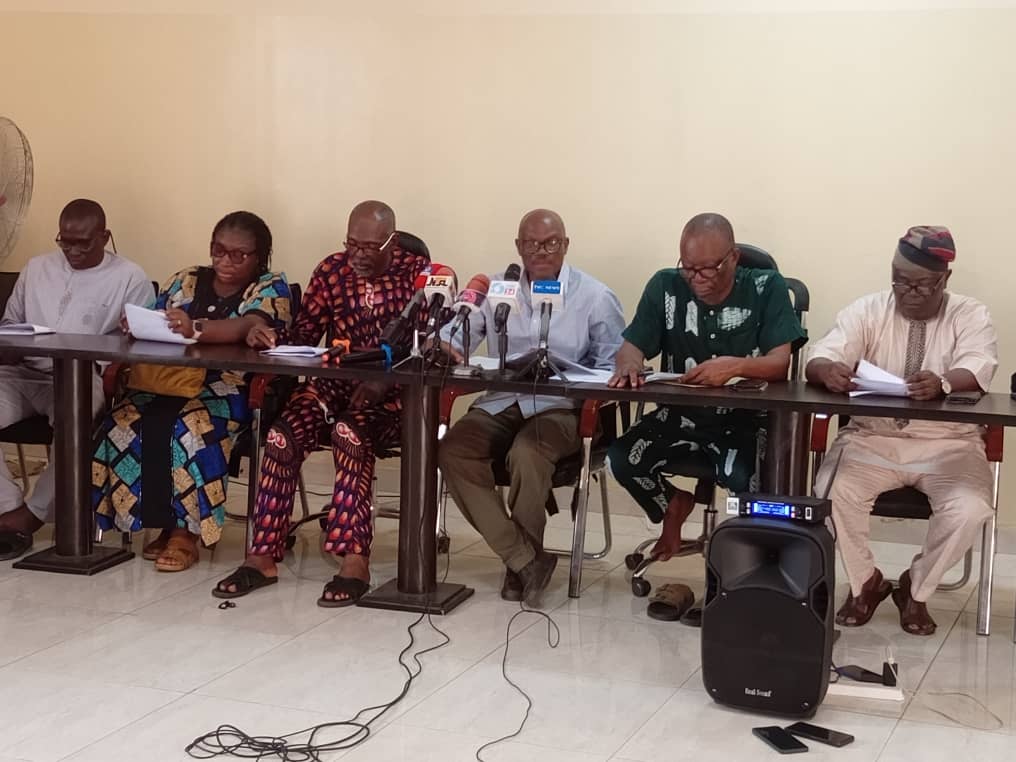Education
IPPIS: You Can’t Turn Universities to Core Civil Service, ASUU Insists

From Chris Gaga, Makurdi
Academic Staff Union of Universities (ASUU) has insisted that there was no going back on its position against the planned enrollment of its members on Integrated Personnel and Payroll Information System (IPPIS) by the Federal government.
The Union’s President, Prof.
Biodun Ogunyemi, who stated this in a chat with newsmen after an interaction with its members at the Federal University of Agriculture, Makurdi (FUAM) on Friday, accused the federal government of trying, through IPPIS, to over-localize Nigerian universities and take them back to the core civil service.The National President however, confirmed that less than 15 lecturers have been registered in ASUU-FUAM against the wish of the union.
“What IPPIS is out to do is to take universities back to the core civil service. We fought that under the military way back in 1992. In fact, the first law that led to autonomy that we are talking about was signed 1993. Our negotiations with federal government since 1992 has always had this component of any circular that is inconsistent with the university autonomy to the extent of its inconsistency will be null and void.
“So, that is to clear the line between the core civil service and universities. The universities are meant to be governed by their laws. The Head of Service is not the employer of universities’ academic staff.
“In fact, under the military, they sacked some of our senior comrades. People like late Prof. Iyayi and the thing was tested in court. The then Head of State, a military president gave directive that Iyayi should be sacked and that matter was taken up to the Supreme Court and he defeated the military government.
“And government pronounced at the Supreme Court that governing councils are the employers of universities academics. So, to that extent, we are convinced that we are on the right track.
“The employers of universities academics are their governing councils and not the Head of Service. Universities are not part of civil service and there is no where in the world where such practice as they are trying to impose on us in Nigeria obtains.
“And we have sited this example before. Ghana at some point, introduced IPPIS but later they excluded the universities because they know it would not work.
“What they (FG) are trying to do in Nigeria is to over-localize us (ASUU) but universities are international learning and research environments. We are now in the age of internationalization. That is why people talk about global ranking of universities, they don’t talk of local ranking of universities.
“It would be an anathema for us to allow government to over localize us. To buy into IPPIS means we are surrendering the autonomy of the universities which is highly cherished all over the world.”
Asked what would happen if the federal government makes good its promise to stop salaries of universities lecturers who refuse to enroll on the IPPIS scheme, the ASUU President said the union would have no other option than to activate it’s resolution on ‘no salary no work’.
He said the information making the rounds that some of its members were secretly enrolling on the IPPIS is not totally correct stressing that the number of its members who may have betrayed its cause was very insignificant.
“The information making the rounds is not totally correct about the number of our members who are betraying the cause of ASUU. I can tell you authoritatively that in this branch (ASUU-FUAM), those who have registered against the wish of the Union are less than 15.
“If you have over 700 members in a branch and you have less than 15 going against the wish of the Union, we can say the number is insignificant. But more importantly, our union has a way of handling matters like that when you work against the directive of the Union.
“We have our own procedure of handling matters by taking them through the procedure for handling disciplinary issues. And that is what we are going to do in this matter.
Education
Strike Looms as ASUU Accuses FG of Endless Agreement Negotiations, Others

By David Torough, Abuja
The Academic Staff Union of Universities (ASUU) has once again raised the alarm over the Federal Government’s persistent failure to honour past agreements, warning that another nationwide strike may be imminent.
ASUU’s new President, Professor Chris Piwuna, at a press conference in Abuja on Friday criticised the government’s inaction on critical issues affecting Nigerian universities.
Piwuna demanded the immediate implementation of all Memoranda of Understanding (MoUs) and Memoranda of Action (MoAs) signed since 2013.
ASUU emphasised that fixing Nigeria requires fixing its universities, which are plagued by poor funding, stalled agreements and government neglect.
The Union also demanded the release of withheld salaries from the 2022 strike and payment to lecturers on part-time and sabbatical appointments affected by the IPPIS payroll system, while condemning political interference in university administration, unlawful appointments, and the undermining of institutional independence.
It further called for an education summit, proper implementation of past agreements, and a stop to the misuse of TETFund resources. It warned it will not remain passive while its members’ rights are trampled.
ASUU urged the government to resolve all outstanding issues to avoid further disruption. While open to dialogue, the union signaled potential industrial action if demands are ignored, reaffirming its commitment to the struggle for quality education.
“Almost three decades since Nigeria’s return to civilian governance, it is not yet Uhuru. The country is still pathetically trapped in the web of multifaceted political malfeasance graphically sign-posted by prebendal politics, mindless manipulation of electoral processes, brazen nepotism, and deliberate subversion of people’s will at every level of governance.
“The sum total of all these is that transparency and accountability have become rare commodities in the hands of the managers of the Nigerian state. Consequently, the generality of citizenry have become despondent, having lost hope and faith in government and its agencies.
“If given the desired attention, Nigeria’s universities should provide the solution ground to solving its multi-faceted and multi-dimensional problems. ASUU has remained focused in the struggle for improved funding and revitalization of these institutions.
“A starting point to achieve this noble goal is to prevail on government to address all outstanding issues in our previous engagements. This will create a conducive atmosphere for addressing the welfare issues of Nigerian academics for the optimal discharge of their statutory responsibilities as the think-tank of the country and mentors for future leaders in all aspects of national development. ASUU remains open to discussion in this respect.
“However, the Union would not continue to look helpless while the rights of its members are being trampled upon and washed away with reckless abandon.”
ASUU stated that the level of implementation of the 2009 FGN/ASUU Agreement is not encouraging, saying that although a few issues are partially implemented, many remain unaddressed.
These, it said include the conclusion of the renegotiation of the 2009 Agreement based on the Nimi Briggs Committee’s draft agreement of 2021; release of withheld three-and-a-half months’ salaries due to the 2022 strike; release of unpaid salaries for staff on sabbatical, part-time, and adjunct appointments affected by the Integrated Payroll and Personnel Information System (IPPIS); release of outstanding third-party deductions such as check-off dues and cooperative contributions; funding for the revitalization of public universities; payment of Earned Academic Allowances (EAA); concerns over the proliferation of universities by federal and state governments; non-constitution of some universities’ governing councils; and adoption of the University Transparency and Accountability Solution (UTAS) in place of IPPIS.
It noted that the government agreed to mainstream the EAA into salaries with the creation of an irregular allowance as a budget line in the 2026 Budget, after releasing N50 billion for the backlog and budgeting N29 billion for the payment of 2025 Earned Academic Allowances and agreed to release N150 billion as a revitalisation fund within four weeks from April 2025.
“However, we are still waiting for government to fulfil these promises. The Union has also reached an understanding with the Yayale Ahmed-led Committee, following the review of the report of the Nimi Briggs-led FGN-ASUU Renegotiation Committee in December 2024. Again, ASUU members have been left in limbo, waiting for the signing of an agreement five months after.
“Delegates at the UNIBEN National Delegates Conference exhaustively evaluated the government’s disposition in resolving outstanding issues with the Union and expressed regrets that nothing has significantly changed in the last two years.
“The irreducible minimum that can guarantee industrial harmony in the Nigerian University System (NUS) is for government to speedily address all outstanding issues including conclusion of the renegotiation of the 2009 FGN/ASUU Agreement, payment of the withheld three-and-a-half months’ salaries, release of the backlog of promotion arrears, payment of withheld salaries of sabbatical and part-time lecturers on account of not signing into the discredited IPPIS, and addressing the unjust victimization of ASUU leaders and members in some state universities.
“Beyond these, we demand a faithful implementation of all issues arising from our previous Memoranda of Understanding (MoUs) and Memoranda of Action (MoAs) government signed with ASUU since 2013.”
ASUU also called on state governors and visitors to these universities to, without further hesitation, resolve lingering issues and reinstate its members without delay in the interest of justice and industrial peace.
On the erosion of university autonomy, the union expressed deep concern. “ome recent developments in Nigeria’s public universities are of grave concern to our Union. We are discomfited by the ongoing attempts to completely erode the autonomy of public universities by the political class and the bureaucrats.”
community
UTME: JAMB To Hold Additional Mop-up Exam for Absent Candidates

Joint Admissions and Matriculation Board (JAMB) says it will conduct additional mop-up examinations for candidates who missed the 2025 Unified Tertiary Matriculation Examination (UTME).
JAMB Registrar, Prof. Is-haq Oloyede, stated this on Wednesday in Abuja at a meeting with key stakeholders to address the challenges encountered during the 2025 UTME.
Oloyede said that the board would accommodate the estimated 5.
6 per cent of candidates who missed the examination by organising a special mop-up exercise.He said that the board had extended the opportunity to all the affected candidates, regardless of the reasons for their absence.
“Normally, we hold one mop-up nationwide for those with one issue or the other.
“But this time, we are creating a new mop-up. Even those who missed the earlier examination due to absence, we will extend this opportunity to them.
“It is not that we are doing something extraordinary; in class, you make up an examination when students miss it for one reason or the other; we just don’t allow abuse of that.
“So we will allow all the candidates who missed the main examination for any reason to take part in this mop-up,” he said.
Oloyede criticised some public commentators who misunderstood and misrepresented the role of UTME, while clarifying that UTME was a placement test and not an achievement test.
According to him, the purpose of the examination is to rank candidates for available spaces in institutions and not to measure intelligence or overall academic potential.
The registrar further stated that high UTME score was not the sole determinant of admission, adding that combined performance, including post-UTME scores and school assessments, could significantly affect a candidate’s ranking.
While acknowledging the emotional strain experienced while announcing the UTME results, he noted that this was not indicative of an institutional weakness.
He expressed JAMB’s commitment to resolving issues affecting the examination process, even as he rejected comments suggesting that the administrative failure was due to incompetence or ethnic bias.
“I want to say this clearly, particularly because I accepted responsibility, not because I do not know how to do the work.
“I say it for the fourth time that no conspiracy theory is relevant to this case.
“Something happened; like people who have been doing something well for years and something just went wrong. That I should now throw them under the bus? No,” he said.
Oloyede, who frowned at those exploiting difficulties to promote ethnic or conspiracy-driven narratives, urged stakeholders to stop ethnic profiling in the education sector.
According to him, many of the criticisms of JAMB’s operations are rooted in ignorance.
The registrar, however, commended his team’s efforts, while also appreciating the resilience shown by candidates, many of whom, he said, had continued their exams, notwithstanding the various challenges. (NAN)
Education
Using CBT for WAEC Will Adversely Affect Sciences— Ebonyi Reps Member

A Federal Lawmaker from Ebonyi, Chief Chinedu Ogah, has declared that the usage of the Computer Based Technology (CBT) for the West African Examination Council (WAEC) would adversely affect science subjects.
Ogah, who represents Ikwo/ Ezza South Federal Constituency at the House of Representatives, made the declaration on Tuesday while speaking with newsmen on WAEC’s proposed plan to introduce CBT from 2026.
The lawmaker said that the move would affect several scientific applications practically used to access students in WAEC examinations.
“What will happen to several scientific.mixtures, equations, mathematical applications among others practically applied during WAEC examinations?.
“Such measures are evidently not feasible and will adversely affect sciences in our educational curricular.
“Science is practical and the earlier we understand this, the better for all,” he said.
He noted that the glitches recorded during the recent Joint Admission and Matriculation Board (JAMB) examination was unfortunate.
“The registrar should review the activities of its Information Communication Technology (ICT) department.
“It is ridiculous for JAMB to conduct the examination without adequate provisions for the ease of candidates,” he said.
Ogah urged people from the south east zone which the glitch was touted to have targeted, to embrace the home grown technology it was known for.
“We are known for technology and innovation.
“Government of south east states should equip our schools with ICT so that students would be acquainted with its usage, early,” he said. (NAN)






















